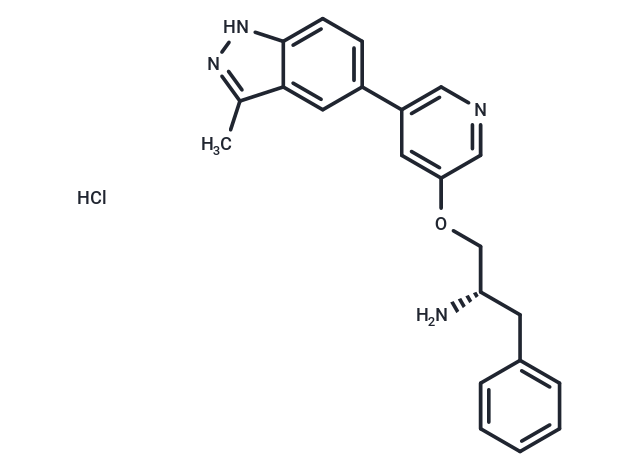Shopping Cart
- Remove All
 Your shopping cart is currently empty
Your shopping cart is currently empty

A-674563 is an Akt1 inhibitor with Ki of 11 nM, modest potent to PKA and >30-fold selective for Akt1 over PKC.

| Pack Size | Price | Availability | Quantity |
|---|---|---|---|
| 1 mg | $47 | In Stock | |
| 5 mg | $113 | In Stock | |
| 1 mL x 10 mM (in DMSO) | $126 | In Stock |
| Description | A-674563 is an Akt1 inhibitor with Ki of 11 nM, modest potent to PKA and >30-fold selective for Akt1 over PKC. |
| Targets&IC50 | Akt1:11 nM(Ki) |
| In vitro | A-674563 is achieved from A-443654 by replacing the indole with a phenyl moiety and getting oral activity. A-674563 slows proliferation of tumor cells with EC50 of 0.4 μM. [1] A-674563 does not inhibit Akt phosphorylation per se, but blocks the phosphorylation of Akt downstream targets in a dose-dependent manner. A-674563 induced Akt blockade results in decreased STS cell downstream target phosphorylation and tumor cell growth inhibiton. A-674563 induces G2 cell cycle arrest and apoptosis in STS cells. [2] |
| In vivo | 20 mg/kg A-674563 increases plasma insulin in an oral glucose tolerance test. A-674563 shows no significant monotherapy tumor inhibitory activity; the efficacy of the combination therapy is significantly improved compared to paclitaxel monotherapy. [1] A674563-treated (20 mg/kg/bid, p.o.) mice exhibits slower tumor growth and more than 50% decrease in the tumor volume at the termination of the study compared with that in control group. [2] A-674563 is identified to have drastically improved PK profile with oral bioavailability of 67% in mouse, but is 70-fold less active than A-443654. [3] |
| Kinase Assay | Akt Kinase Assay: The kinase assay uses His-Akt1 and a biotinylated mouse Bad peptide as substrate. The kinase assay is carried out at room temperature for 30 minutes in 50 μL of reaction buffer [20 mM HEPES, pH 7.5, 10 mM MgCl2, 0.1% (w/v) Triton X-100, 5 μM ATP (Km = 40 μM), 5 μM peptide (Km = 15 μM), 1 mM DTT, 60 ng of Akt1, and 0.5 μCi of [γ-33P]ATP] in the presence of different concentrations of A-674563. Each reaction is stopped by adding 50 μL of termination buffer (0.1 M EDTA, pH 8.0, and 4 M NaCl). The biotinylated Bad peptides are immobilized on streptavidin-coated FLASH plates. After being washed with PBS-Tween 20 (0.05%), the 33P phosphopeptide captured on the FLASH plates is measured with a TopCount Packard Instruments γ counter. |
| Cell Research | The cells on 96-well plates are gently washed with 200 μL of PBS. Alamar Blue reagent is diluted 1:10 in normal growth media. The diluted Alamar Blue reagent (100 M) is added to each well on the 96-well plates and incubated until the reaction is complete as per manufacturer's instructions. Analysis is done using an fmax Fluorescence Microplate Reader, set at the excitation wavelength of 544 nm and emission wavelength of 595 nm. Data are analyzed using SOFTmax PRO software provided by the manufacturer. (Only for Reference) |
| Alias | A674563 |
| Molecular Weight | 358.44 |
| Formula | C22H22N4O |
| Cas No. | 552325-73-2 |
| Smiles | Cl.Cc1n[nH]c2ccc(cc12)-c1cncc(OC[C@@H](N)Cc2ccccc2)c1 |
| Relative Density. | 1.229 g/cm3 |
| Storage | store at low temperature | Powder: -20°C for 3 years | In solvent: -80°C for 1 year | Shipping with blue ice. | ||||||||||||||||||||||||||||||||||||||||
| Solubility Information | H2O: 66 mg/mL (184.13 mM), Sonication is recommended. DMSO: 67 mg/mL (186.92 mM), Sonication is recommended. Ethanol: 15 mg/mL (41.85 mM), Sonication is recommended. | ||||||||||||||||||||||||||||||||||||||||
Solution Preparation Table | |||||||||||||||||||||||||||||||||||||||||
Ethanol/H2O/DMSO
H2O/DMSO
| |||||||||||||||||||||||||||||||||||||||||

Copyright © 2015-2025 TargetMol Chemicals Inc. All Rights Reserved.